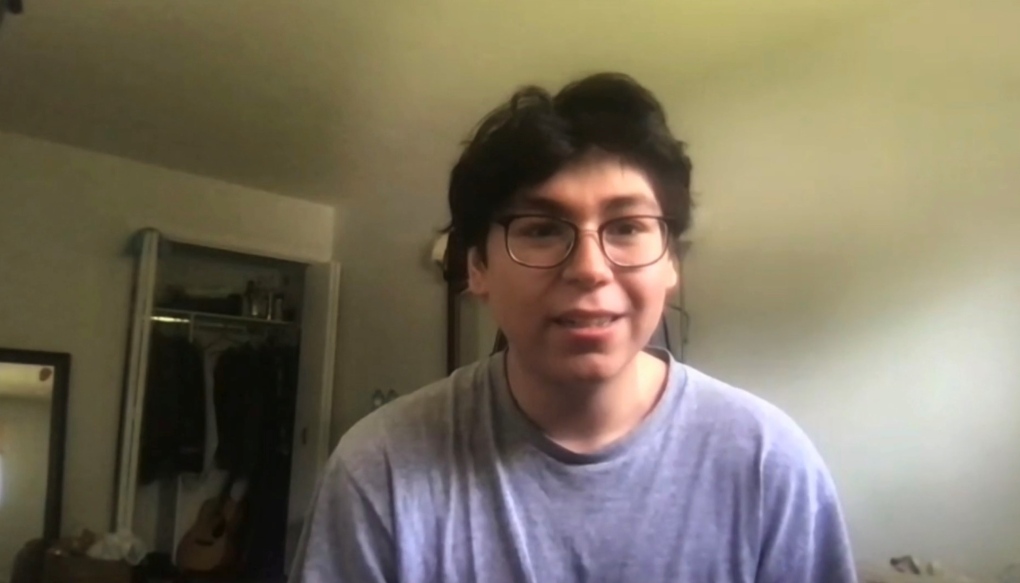'It is Canada's History': winners of James Bartleman Indigenous Creative Writing Award reflect on residential school discovery
Two of the winning recipients from the James Bartleman Indigenous Creative Writing Awards are sharing their thoughts with CTV News Toronto on the disturbing discovery of 215 children's remains at a former residential school in Kamloops, British Columbia.
They are among six young Indigenous people recognized Friday for writing excellence as part of a virtual ceremony normally held at Queen’s Park. They also each received a cheque for $2,500.
The awards are named on behalf of Ontario’s first Indigenous Lieutenant Governor.
“It means more than you could ever know,’ Kaylem Daybutch, 20, said while accepting his award.
The story, written when he was 18, is about a young man with schizophrenia who finds solace in an imaginary woman, showing the joy in one’s life even with mental health struggles.
He’s now a third-year student at Algoma University in Sault Ste. Marie — the building itself is a former residential school.
 Kaylem Daybutch, 20. (Beth Macdonell/CTV News Toronto)
Kaylem Daybutch, 20. (Beth Macdonell/CTV News Toronto)
“For me to digest something like this and about my own people, my family somewhere down the line has gone to residential schools, and I think the most difficult thing processing it is why haven’t we done this for every school still up,” he told CTV News Toronto in an interview Friday.
Daybutch said as horrifying as the truth is, it is Canada’s history.
“It’s in the roots, it’s the roots of Canada, whether you are Indigenous, white, Black, Asian, the point is if you’re walking on this country, you’re walking on the roots of trauma, you’re walking on the roots of blood that didn’t need to be shed,” Daybutch said.
Ariel Wendling, 19, won for her essay on the prevalence of mental health in everyday life and the need to share feelings and experiences. She said she’s internally grateful for the award.
Wendling said the burial grounds in Kamloops are sad, but she’s not surprised thanks to a high school teacher who taught her about residential schools.
“I think this has been attention on something that needed attention, so a lot of kids especially my age, even adults weren’t aware this was happening,” she said from Port Colborne, Ontario.
Wendling said she sees a connection between her essay and the survivors of the schools.
“I know a lot of people who have survived through these schools suffer from PTSD and other mental health issues and I think they do have a link,” she said. “I do believe they need more support.”
CTVNews.ca Top Stories

DEVELOPING UnitedHealthcare CEO shot in Manhattan, gunman flees on e-bike, officials say
UnitedHealthcare CEO Brian Thompson was killed Wednesday morning in what investigators suspect was a targeted shooting outside a Manhattan hotel where the health insurer was holding an investor conference.
2 Quebec men top BOLO program's latest Top 25 list of Canada's most wanted
Two men believed to be central figures in Quebec’s violent and ongoing drug conflict topped the Bolo Program's latest Top 25 list of Canada's Most Wanted fugitives.
Air Canada to bar carry-on bags for lowest-fare customers
Air Canada says it will bar carry-on bags and impose a seat selection fee for its lowest-fare customers.
Warm, wet winter expected in much of Canada, say forecasters
Federal forecasters expect a warmer-than-normal winter in most of Canada, with more precipitation than usual in parts of the country.
Sweden and Finland want citizens to be prepared for war. Should Canada do the same?
As Russia's invasion of Ukraine approaches its third year, nearby Nordic countries like Sweden and Finland are preparing their citizens to survive during a military conflict. Should Canada be doing the same?
$80-million jackpot: 2 winning tickets sold in Canada
There are two winners of the $80 million Lotto Max jackpot, Ontario Lottery and Gaming (OLG) has announced. The prize will be split between two tickets sold in Quebec and Alberta, respectively.
Poilievre offers two hours of House time Monday for Freeland to present fall economic statement
In absence of Deputy Prime Minister and Finance Minister confirming a date to present a fall economic statement, Conservative Leader Pierre Poilievre is offering to give up two hours of scheduled opposition time next Monday to 'tell us how much she's lost control of the nation's finances.'
Dollarama buys land for Calgary warehouse, targets 2,200 Canadian stores by 2034
A new Dollarama distribution centre and a lot more of the chain's stores are headed for Canada over the next decade.
Facial recognition to board a plane: How does it work, and what are the privacy concerns?
Air Canada has launched facial recognition technology at the gate for people flying out of Vancouver International Airport - with the promise of a faster boarding process with fewer hassles.

































